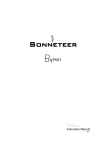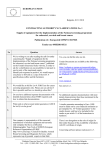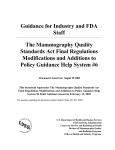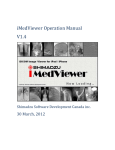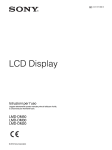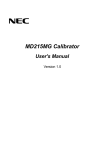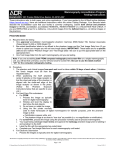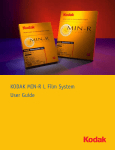Download MQSA Quality Control Manual
Transcript
MQSA Quality Control Manual MQSA Quality Control Manual for Monochrome Displays for Mammography Ver1.0 Applicable Models LMD-DM50, LMD-DM30 Sony Corporation - 1 - MQSA Quality Control Manual MQSA Quality Control Manual for Monochrome Displays for Mammography Foreword Purpose of this Document This document is for Monochrome Displays for Mammography, diagnostic displays to perform the Quality Control (QC) tests to meet the guidelines / regulations of Mammography Quality Standards Act (MQSA) for the reading of the digital mammographic images. This document describes the procedure for performing the Quality Control (QC) tests for Monochrome Displays for Mammography, diagnostic displays based on the guidelines / regulations of Mammography Quality Standards Act (MQSA). Scope of this Manual This document is referenced when conducting the Quality Control (QC) tests to Monochrome Displays for Mammography, diagnostic displays based on the guidelines / regulations of Mammography Quality Standards Act (MQSA) for the reading of the digital mammographic images through the full-field digital mammography (FFDAM) system. Regulatory Considerations For the facilities under the MQSA regulations, application of this manual is MANDATORY. Failure to follow these quality assurance procedures can result in loss of MQSA certification at facilities subject to the MQSA regulations. For the facilities under the MQSA guidelines, application of this manual is RECOMMENDED. Otherwise, the facilities may identify other ways of meeting MQSA requirements. Applicable Models LMD-DM50, LMD-DM30 - 2 - MQSA Quality Control Manual Contents Foreword ............................................................................................................................................2 Contents .............................................................................................................................................3 Installation ........................................................................................................................................5 Chapter 1: QC TESTS FOR THE RADIOLOGIC TECHNOLOGIST 1 Introduction ..................................................................................................................................6 2 Intervals for Procedures .............................................................................................................6 3 Cleaning Display ..........................................................................................................................7 3.1 Objective ................................................................................................................................7 3.2 Frequency ..............................................................................................................................7 3.3 Required Equipment .............................................................................................................7 3.4 Procedure ...............................................................................................................................7 4 Viewing Conditions Check ..........................................................................................................8 4.1 Objective ................................................................................................................................8 4.2 Frequency ..............................................................................................................................8 4.3 Required Equipment .............................................................................................................8 4.4 Procedure ...............................................................................................................................8 Form 1: Daily Test .........................................................................................................................9 5 Image Quality Check - SMPTE pattern.....................................................................................10 5.1 Objective ..............................................................................................................................10 5.2 Frequency ............................................................................................................................10 5.3 Required Equipment ...........................................................................................................10 5.4 Procedure .............................................................................................................................10 Form 2: SMPTE Pattern...............................................................................................................12 Chapter 2: QC TESTS FOR THE MEDICAL PHYSICIST 1 Introduction ................................................................................................................................13 2 Intervals for Procedures ...........................................................................................................13 3 Viewing Conditions Check and Setting ...................................................................................14 3.1 Objective ..............................................................................................................................14 3.2 Frequency ............................................................................................................................14 3.3 Required Equipment ...........................................................................................................14 3.4 Procedure .............................................................................................................................14 Form 3: Viewing Condition Check and Setting ..............................................................................15 - 3 - MQSA Quality Control Manual 4 Display Calibration .................................................................................................................16 4.1 Objective ...........................................................................................................................16 4.2 Frequency .........................................................................................................................16 4.3 Required Equipment 4.4 Procedure ........................................................................................................16 ..........................................................................................................................16 Form 4: Display Calibration........................................................................................................20 5 Image Quality Check – SMPTE pattern ...................................................................................21 5.1 Objective ..............................................................................................................................21 5.2 Frequency ............................................................................................................................21 5.3 Required Equipment ...........................................................................................................21 5.4 Procedure ..........................................................................................................................21 Form 5: SMPTE Pattern...............................................................................................................25 Definition .......................................................................................................................................26 - 4 - MQSA Quality Control Manual INSTALLATION Connecting the cables Follow the instructions in the display manual to properly connect the communication cable supplied with the display. Installing calibration software and sensor driver Install the calibration software “Display Calibrator software” and sensor driver into the workstation. - 5 - MQSA Quality Control Manual Chapter 1: QC TESTS FOR THE RADIOLOGIC TECHNOLOGIST 1 INTRODUCTION QC tests that are listed in this section are to provide the procedure for maintaining Monochrome Displays for Mammography, diagnostic displays in its designed optimal quality conditions by keeping the displays free of any image quality deterioration and by performing the regular viewing conditions and image quality checks. QC tests for the diagnostic display are described in the following sections: • Section 3: Cleaning Display • Section 4: Viewing Conditions Check • Section 5: Image Quality Check - SMPTE pattern 2 INTERVALS FOR PROCEDURES The table below shows intervals for each procedure described in this manual. Procedure Interval Cleaning Display Daily Viewing Condition Daily Image Quality Check – SMPTE pattern Daily - 6 - MQSA Quality Control Manual 3 CLEANING DISPLAY 3.1 Objective To maintain the screen, clean by keeping the display screen free from any objects (dust, finger print, etc.) of the display of Monochrome Displays for Mammography 3.2 Frequency Daily 3.3 Required Equipment Lint free cloth 3.4 Procedure Note: The cabinet is made of plastic and coated metal plate. Do not apply thinner, benzene, or alcohol. It could damage the plastic and/or the coating could come off. 1. When cleaning the display, remove the AC adaptor from the display and the wall outlet for your safety. 2. Dampen the lint free cloth with cleaning agent designed specifically for cleaning Computer Displays and remove the dust gently. Finish up by wiping with the dry cloth. 3. Clean the LCD panel (protective filter) and the surface periodically with a dampened soft cloth. 4. Record the result on the form 1 in this manual. Note: Do not use Windex or household cleaners which can damage the Display’s AR coating. Note: Be careful when handling the LCD panel (protective filter). Do not rub or hit with sharp or hard objects. Do not press on the panel. It could cause unevenness in luminance or damage the panel. - 7 - MQSA Quality Control Manual 4 VIEWING CONDITIONS CHECK 4.1 Objective To keep and maintain the optimal viewing conditions on Monochrome Displays for Mammography 4.2 Frequency Daily 4.3 Required Equipment Monochrome Displays for Mammography, display (LMD-DM50 or LMD-DM30) USB cable for communicating between PC and display. 4.4 Procedure 1. Review the data form “Form 3: Viewing Conditions Check and Setting” on P15 (completed by the Medical Physicist during the most recent evaluation) posted in the reading room. Refer this form as optimal during your future evaluation. 2. Match the room configuration where each display is located to the one specified in the data form. 3. Adjust the room configuration if the current reading room configuration differs from the one established as optimal in the data form. (For example, if desk lights were specified to be turned off, turn them off, or, if curtains were specified to be closed, close them.) 4. Complete the record of the check on the form 1 in this manual. - 8 - MQSA Quality Control Manual Form 1: Daily Test Daily Facility: Room: Checked by: Year Date Month 1 2 3 4 5 6 7 8 9 10 11 12 13 14 15 17 18 19 20 21 22 23 24 25 26 27 28 29 30 31 Initial Cleaning Display Viewing Conditions Date Initial Cleaning Display Viewing Conditions Display Serial #1: Display Serial #2: - 9 - 16 MQSA Quality Control Manual 5 IMAGE QUALITY CHECK - SMPTE PATTERN 5.1 Objective To calibrate the displays as accurate as possible for the reading of mammographic images on Monochrome Displays for Mammography 5.2 Frequency Daily 5.3 Required Equipment Monochrome Displays for Mammography, display (LMD-DM50 or LMD-DM-30) USB cable for communicating between PC and display Calibration software that comes with LMD-KT10 Calibration Kit 5.4 Procedure 1. Select “Display Calibrator software” from the Start menu to start this software application. 2. Select the “Test Patterns” Tab. Click the display icon to choose the display to test and click the “SMPTE” pattern. - 10 - MQSA Quality Control Manual 3. Check the SMPTE pattern. The “SMPTE” pattern will appear. View the display directly in front of the display. (The observer must be at least 50cm from the display screen.) 4. Visibility of the following features must be examined. a. The 0 - 5% contrast pattern b. The 95 - 100% contrast pattern c. The 0 - 100% each gray level step from the adjacent squares (For example: the 0 - 10% square or the 90 - 100% square) d. The borders and lines of the pattern and that they are straight and the pattern is in the active area of the display e. No distortion and misalignment using the grids across the screen (Linearity) f. The sharpness of the alphanumeric characters and that they are in focus g. The high contrast line-pair images (each line in vertical and horizontal stripes in the square) at the center and on the corners of the SMPTE pattern without magnification h. The streaking in and around the white and the black rectangles (Video Characteristic) 5. Records the results on the form 2 in this manual. - 11 - MQSA Quality Control Manual Form 2: SMPTE Pattern Daily Location Name: Address: Display Serial #1: Display Serial #2: Test Display #1 Display #2 0%-5% contrast 95%-100% contrast Gray level steps Boarders, lines, centering Linearity Alphanumerics Line-pair images (center) Line-pair images (corners) Video Characteristics (Pass or Fail) Testing Person Name: Signature: Date: - 12 - MQSA Quality Control Manual Chapter 2: QC TESTS FOR THE MEDICAL PHYSICIST 1 INTRODUCTION The QC tests listed in this section must be performed by the Medical Physicist to ensure that the diagnostic display of Monochrome Displays for Mammography is operating in its optimal and highest quality standard. These tests also must be performed when a major change that possibly causes the change to its viewing quality and to its viewing performance such as the installation of a new diagnostic display of Monochrome Displays for Mammography, the repair or replacement of a major component of the system, or relocation of the diagnostic display happens. QC tests for the diagnostic display are described in the following sections: • Section 3: Viewing Conditions Check and Setting • Section 4: Display Calibration • Section 5: Image Quality Check – SMPTE pattern 2 INTERVALS FOR PROCEDURES The table below shows intervals for each procedure described in this manual. Procedure Interval Viewing Condition Check and Setting Annually Display Calibration Annually Image Quality Check – SMPTE Pattern Annually - 13 - MQSA Quality Control Manual 3 VIEWING CONDITIONS CHECK AND SETTING 3.1 Objective To keep and maintain the optimal viewing conditions on Monochrome Displays for Mammography 3.2 Frequency Annually 3.3 Required Equipment Illuminance Meter 3.4 Procedure Before the measurement: • Turn on displays for at least 60 minutes before starting measurement. • Reduce any lighting coming from other sources such as viewboxes, over head or task lighting to the minimum and check that the ambient lighting is stable (no flickering effect due to any of the lighting sources that are turned on). 1. Make each display as dark as possible. (For example, by minimizing the application windows or displaying a black flat field) 2. Measure the illuminance. (Face the photometer away from the surface of the display screen during the illuminance measurement.) 3. Check that the measured illuminance value does not exceed 20 lux. (Adjust the room ambient light and/or the room configuration to maintain the illuminance value under the limit if it exceeds.) 4. Fill out the display positions, room lights, desk lights, etc. established as optimal on the form 3 in this manual. (Note: This data form will be referred by the Radiologic Technologist as optimal during their daily “VIEWING CONDITIONS CHECK” on the page 8.) 5. Record the ambient light value on the form 3 in this manual. 6. Draw a room layout sufficiently accurate on the form in this manual, so that the Radiologic Technologist can reproduce the illumination conditions established as optimal during their daily “VIEWING CONDITIONS CHECK”. 7. Post the form in the reading room, so that the Radiologic Technologist can easily access and refer during their daily “VIEWING CONDITIONS CHECK”. 8. Restore each display to its normal condition, i.e., undo any measures taken in Step 3.4.1 to darken the display. - 14 - MQSA Quality Control Manual Form 3: Viewing Conditions Check and Setting Annually Facility: Room: Date: Room Description Display Positions: Room Lights: Desk Lights: Others: Ambient Light value: Note: Confirmation of this value is not part of the daily check by the Radiologist Technologist. Important: The ambient light level must not exceed 20 lux. Room Layout Note: Draw sufficiently accurate for the Radiologic Technologist. ※ Post this form in the reading room for the Radiologic Technologist’s daily “VIEWING CONDITIONS CHECK”. - 15 - MQSA Quality Control Manual 4 DISPLAY CALIBRATION 4.1 Objective To ensure that an accurate evaluation of the display will be conducted to perform an accurate calibration for the reading of the mammographic images on Monochrome Displays for Mammography 4.2 Frequency Annually 4.3 Required Equipment Monochrome Displays for Mammography, display (LMD-DM50 or LMD-DM30) USB cable for communicating between PC and display Calibration software that comes with LMD-KT10 Calibration Kit Calibration sensor that comes with LMD-KT10 Calibration Kit 4.4 Procedure 1. Select “LMD-KT10” > “Display Calibrator software” from the Start menu of Windows. Attach the calibration sensor to center of the displayed box as shown on the display to calibrate and click “Calibration”. - 16 - MQSA Quality Control Manual 2. Usually, you don’t need to change calibration settings. To start calibration, click “Start”. If you want to change settings, click “Change Settings” 3. If you select “Calibration Settings” at the previous step, refer to the table below for detail information about each parameter and make necessary changes on the screen. Click “OK” to return to the previous screen. - 17 - MQSA Quality Control Manual Setting Explanation Maximum Luminance The target brightest luminance. Use the default value of 410 cd/m2 or 500 cd/m2 (display’s factory default) unless otherwise necessary. Important: Maximum luminance is settable within the range specified on the wizard. However, due to luminance degradation caused by deterioration of the backlight, the result may fall short of the target luminance. Minimum Luminance The target darkest luminance. Use the default value of 0.8 cd/m2 unless otherwise necessary. Ambient Light The effects of ambient light. Enter the value only if it is known, otherwise leave it as is. Hint:The current ambient light can be measured by clicking the Measure button. (Except for ME511L) Gamma Setting Comment Gamma setting should be DICOM GSDF (Recommended) Add a comment at the time of adjustment for later reference. This can be left blank. 4. Record the Gamma setting, max. luminance, min. luminance and ambient light (optional) value of each display set at on the Form 4 in this manual. - 18 - MQSA Quality Control Manual 5. When calibration is completed, the “Finishing Calibration” window is displayed with the results. Click “Show Details” to display graphical outputs. - 19 - MQSA Quality Control Manual Form 4: Display Calibration Annually Location Name: Address: Display Serial #1: Display Serial #2: Test Display #1 Setting Display #2 Result Setting Result Configuration Gamma Max. Luminance cd/m2 cd/m2 cd/m2 cd/m2 Min. Luminance cd/m2 cd/m2 cd/m2 cd/m2 Ambient Light cd/m2 cd/m2 cd/m2 cd/m2 (Pass or Fail) Testing Person Name: Signature: Date: - 20 - MQSA Quality Control Manual 5 IMAGE QUALITY CHECK - SMPTE PATTERN 5.1 Objective To ensure that the display calibration has been performed properly by the evaluation of the black & white levels, gray-scale display function, luminance uniformity and artifact (noise) for the reading of the mammographic images on Monochrome Displays for Mammography 5.2 Frequency Annually 5.3 Required Equipment Monochrome Displays for Mammography, display (LMD-DM50 or LMD-DM30) USB cable for communicating between PC and display Calibration software that comes with LMD-KT10 Calibration Kit 5.4 Procedure Select “LMD-KT10” > “ Calibration Software” from the Start menu to start this software application. 1. To display a test pattern, select “Test Patterns” Tab. The selected test pattern is displayed on the selected display. - 21 - MQSA Quality Control Manual 2. The “SMPTE” pattern will appear. View the display directly in front of the display. (The observer must be at least 50cm from the display screen.) 3. Check that black-in-white and white-in-black levels are distinguishable and no artifacts (noise) are observed. Record the result on the form 5 in this manual. - 22 - MQSA Quality Control Manual 4. Check that each gray-scale pattern and 0 - 5% & 95 - 100% contrasts are distinguishable and no artifacts (noise) are observed. Record the result on the form 5 in this manual. 5. Go back to the main screen of “Test Patterns”, and select ‘’TG-18-UN80”. If you don’t see the main screen, just click anywhere on the test pattern to recall it. - 23 - MQSA Quality Control Manual 6. The “TG18-UN80” pattern will appear. View the display directly in front of the display. (The observer must be at least 50cm from the display screen.) 7. Check that luminance non-uniformity is not observed from the center to the edges. Record the result on the form 5 in this manual. - 24 - MQSA Quality Control Manual Form 5: SMPTE Pattern Annually Location Name: Address: Display Serial #1: Display Serial #2: Test Display #1 Display #2 Black-in-White & White-in-Black Levels (SMPTE) Gray-Scale Display Function (SMPTE) 5-10%, 95-100% contrast (SMPTE) Artifact (Noise) (SMPTE) Luminance Uniformity (All White / TG18-UN80) (Pass or Fail) Testing Person Name: Signature: Date: - 25 - MQSA Quality Control Manual DEFINITION SMPTE Society of Motion Picture and Television Engineers, Inc. Display Calibrator Software Calibration software application Display Quality Controller Quality assurance software application MQSA Mammography Quality Standards Act FFDM Full-Field Digital Mammography AAPM TG18 American Association of Physicists in Medicine, Task Group 18 Chroma5 x-rite calibration sensor DICOM Digital Imaging and Communications in Medicine GSDF Grayscale Standard Display Function JND Just Noticeable Difference lux One lux is the illuminance at the same point at a distance of 1 meter from the source. One lumen uniformly distributed over one square foot of surface provides an illumination of 1 foot-candle. - 26 - MQSA Quality Control Manual Notes for the User's Manual • No part of this manual, whether partly or wholly, may be reproduced or copied without authorization. • The content of this manual is subject to change without notice. • Although this manual has been prepared carefully, please let us know if you find any errors, omissions, or ambiguous explanations. Sony Corporation 1-7-1 Konan, Minato-ku, Tokyo, 108-0075 Japan. - 27 -






























